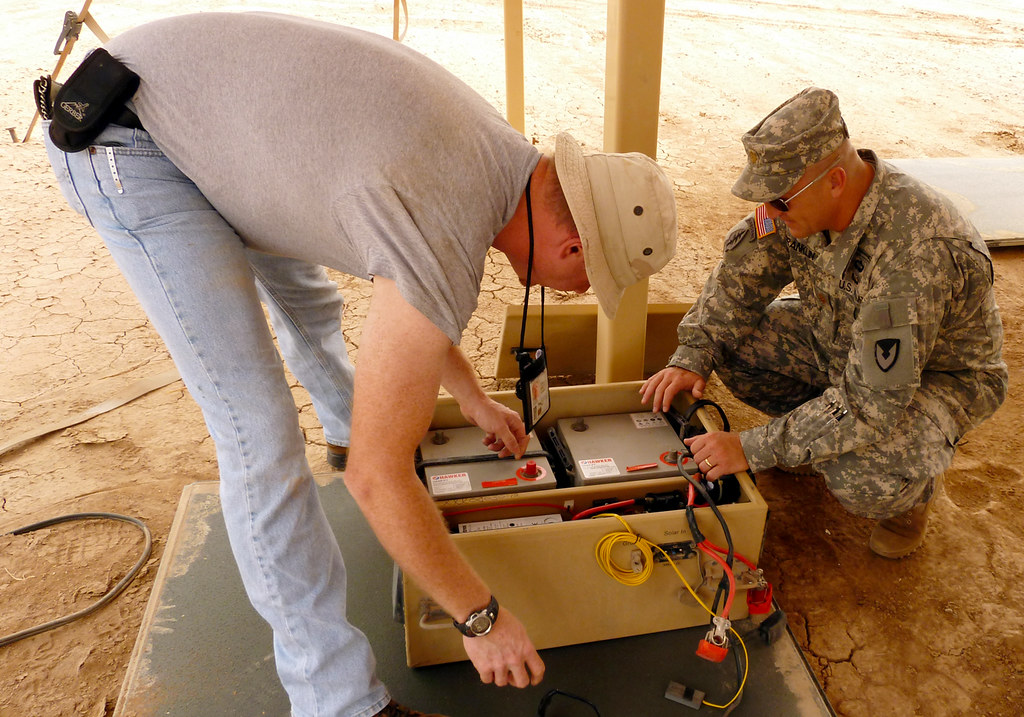If you're into military technology, you should check out thees great police technology articles and see where the two are related!
U.S. Army Africa is working in cooperation with U.S. Army Natick Research, Development and Engineering Center on a solar shade system in Camp Lemonnier, Djibouti, that produces two kilowatts of power. Natick engineer Steve Tucker is the lead project manager and brings a unique skill set to the mission.
Tucker has never served as a Soldier, but his daily service to the U.S. Army is remarkable.
Tucker is an electrical engineer by trade and works for the U.S. Army Natick Research, Development and Engineering Center in Massachusetts. His list of deployments in combat zones and isolated areas included Iraq, Afghanistan, Egypt and Korea. His trip to Djibouti focused on a limited military use assessment of a solar energy project called the solar shade. It’s a project he’s working in cooperation with U.S. Army Africa.
He began his Army civilian career shortly after Sept. 11, 2001. In the opening days of Operation Iraqi Freedom, Tucker was working alongside Soldiers in Mosul, Iraq, during a year-long tour.
In many respects, his demeanor is dyed-in-the-wool Army green.
While in Djibouti, his bunk in the containerized living unit or CLU, sported hospital corners and the obligatory dollar-width top sheet fold over the blanket. His speech is infused with a lexicon of Army acronyms and you can tell he genuinely enjoys working with Soldiers.
Before coming to work for the Army, Tucker was an electrical engineer in the private sector for nearly 20 years. He’s worked on high speed computer upgrades, nuclear medical equipment and helped develop an underwater re-breather system for divers.
For Tucker, working in places where the heat is often far above the 100 degree mark and the humidity is nearly 100 percent, it’s all part of the job. He’s in his element in the austere and scorching environment of Djibouti where he checked out one of his projects, a solar shade that produces two kilowatts of power on a daily basis.
“There are always challenges working in places like Camp Lemonnier. Sure it’s hot and muggy, but it’s always great to be helping our Soldiers. The solar shade can help Soldiers in multiple ways,” he said. Tucker explains some of the benefits of the solar shade.
“If you had a tent under the solar shade, it would block up to 90 percent of the sun heating the tent up. It could significantly reduce the cost to cool the tent. It’s extremely efficient in two ways. You get an energy savings because the shade blocks direct sunlight from tent skin. And you are also generating energy with the photovoltaic modules on the exposed surface of the shade,” Tucker said.
“With the solar shade, it’s low or no maintenance and no fossil fuel consumption. The logistics trail is short. This is ideal for isolated places where it is extremely expensive or difficult to ship fuel. A repeater site for radio transmission, remote village stability operations or even in a disaster relief scenario…where power isn’t available off the grid,” Tucker said.
Tucker is a lean, tall master mechanic, SCUBA diver and classic Harley owner and enthusiast. He’s constantly fixing and adjusting equipment like the air conditioner in his temporary quarters at Camp Lemonnier. The door lock didn’t escape his fix-it-now approach to life, so he treated it with a squirt of machine oil. With his attention to detail, you can tell why he became an engineer.
While cleaning up modules on the solar shade he expressed satisfaction in the project.
“Overall, I’m pleased how the unit has weathered the high winds, exposure to ultraviolet light and the harsh conditions of Djibouti. It’s performed extremely well,” Tucker said.
Tucker explained some of the solar shades features.
“The shade will block about 80-90 percent of the solar load. There are a lot of solar cells that convert sunlight to free and clean energy. The solar shade uses flexible photo voltaic panels. It’s light and thin. The trade off is that it doesn’t produce as much electricity as single crystal rigid photo voltaic cells. This system is ideal for an austere, off-the-grid environment,” Tucker said.
“I’d like to see this picked up by a program manager who is really interested in alternative energy. Someone who is interested in decreasing their organizations logistics fuel tail and providing our Soldiers with something that can give them power with minimal maintenance,” Tucker said.
Tucker says that there may be a place for alternative energy sources in the military.
“A possible holistic approach to energy management might be in a mini grid system for expeditionary or remote sites. This would combine alternative and traditional energy sources on an as needed basis. These micro grids would use intelligent control of generators – storing energy in battery banks and shutting off the generator off when it’s not needed. The generator is using fuel whether the energy is being used or not. The main goal is to stop burning fuel when it’s not needed. It’s being done in the U.S. with wind and solar energy in large electrical grid,” Tucker said.
“I’ve enjoyed everything that I’ve done in my career, but none of it as much as I enjoy working for the military,” Tucker said. “Every project I work on that can support the Soldier in the field – those projects have a part of my heart.”
You can see more photos of the shade system in action on U.S. Army Africa’s Flickr page.









No comments:
Post a Comment